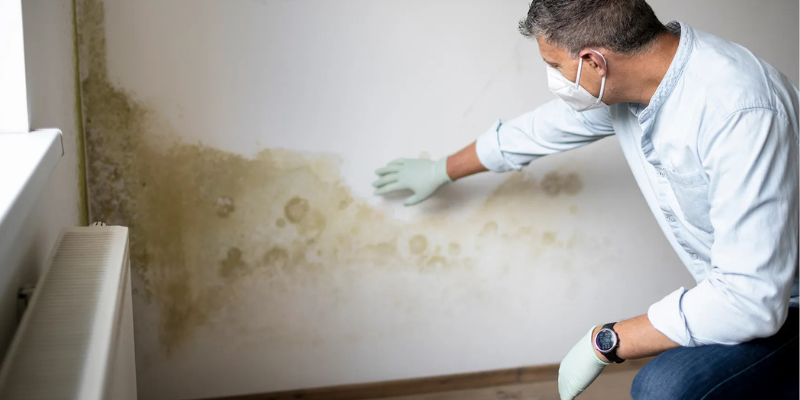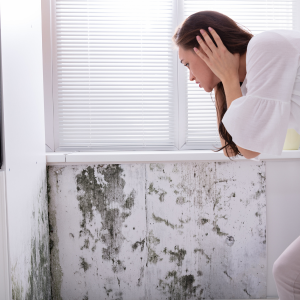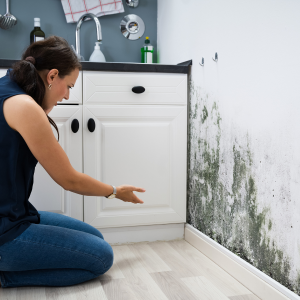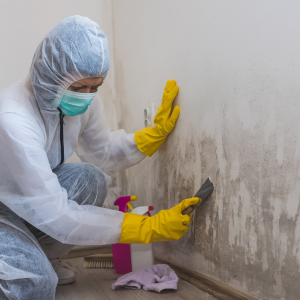
While selling any house in Maryland with mold may seem overwhelming, proper insights and guidance may alleviate this anxiety. Here, I present a deep dive into addressing mold problems, providing homeowners needing remediation with relevant information. There are distinct considerations a seller must comply with as per Maryland mold real estate laws, and that is one component of this resource, as is remediation. The help this resource offers is focused on navigating any obstacles while, where possible, fetching a commendable selling price. Anticipate resolving the mold sale hitches list, as professional guidance on selling the house, prepping for the sale, and addressing buyer objections will help.
Understanding Mold Issues When Selling in Maryland
Selling a property with mold in Maryland can significantly affect how buyer prospects perceive it, especially in a humid area such as Maryland, where mold is common. With such humid weather, mold can thrive. Out of all the types of mold, black mold has the most negative impact on people’s health, and as a result, it can significantly affect how buyers perceive a property.
Not addressing mold issues can be a problem. Mold can impact a house’s overall marketability and price by lowering it significantly. Sellers within Maryland are obliged by law concerning mold disclosure. Sellers should remain non-biased and disclose unresolved mold issues, treatments, and prevention measures. If these steps are neglected, it can damage a seller’s reputation and cause other monetary losses.
This monograph analyzes the most practical mold concerns from the perspective of Maryland homeowners, the impact of visible and concealed mold on real estate transactions, and how to strategically mold proactive measures to be undertaken by sellers to tackle these matters. With an adequate understanding of risk and the necessary legal implications, homeowners and/or sellers could decrease the depreciation of their property, enhance buyer trust, and optimize the sales process.
Direct MD Cash Buyers buys houses in Maryland, including properties with mold. Selling a home with mold can be challenging due to health risks, disclosure requirements, and potential impacts on market value. Our company offers a fast, transparent solution, helping homeowners sell their property as-is while avoiding the stress and costs of mold remediation.
Common Mold Concerns in Maryland Homes
Mold is a relevant issue for homeowners in Maryland. The state’s climate is perpetually humid, thus providing ideal conditions for mold growth. Due to moisture and poor ventilation, mold is frequently found in areas such as bathrooms, attics, and basements. The presence of black mold harms one’s health and can also ward off potential buyers. As required by the law in Maryland, homeowners must disclose any mold issues.
With utmost care, all the underlying issues must be attended to, including, but not limited to, inspections, repairs, and humidity control, to ensure mold does not spread. The internal quality of air is maintained, and the structure is preserved. Minor mold presence can be worrisome for buyers as the potential for severe underlying damage and health problems is high, resulting in a depreciation in the home’s value.
Buyers in Maryland are more aware of mold and tend to ask for an inspection even before closing the sale. Mold problems can reinforce buyer concerns, and sellers can use mold remediation services to help improve appeal and buyer reassurance. Exposed issues can and should be dealt with.
Among the problems, any embedded form of sensitive information picturing action disclosure, ex post handling of the matter is most excruciating, given the default predictive setting of any mold action template. Legal norms are reconciled with practical approaches to the sales cycle. Compliance with legal obligations, effective management in handling mold, and home ownership lower the boundary for relational friction to untrustworthy sales.
Recognizing the Impact of Mold on Property Values
In Maryland, mold growth within a property can considerably compromise its valuation by affecting the asking price and the probability of selling it successfully. Potential buyers associate visible mold with secondary problems like structural difficulties or water intrusion, which results in buyers lowering their price or asking for mold remediation before closing. Unreported mold problems also violate mold disclosures, which entail monetarily and legally severe penalties.
In Maryland, competitive real estate market boundaries can be considerably breached by mold problems even on the premises. Advancements in technology with black mold, which entails severe health problems, can be a dealbreaker in buyers’ decisions. Sellers consider remediation. Property history can and often does cause buyer skepticism and disrupt a whole documentation suite, usually resulting in warranty or price negotiation.
Like other states, Maryland law protects buyers by requiring full disclosure of known mold issues, showing balanced market practices. Not mentioning them may lead to breaches of contract or lawsuits, which is damaging to the market. To improve the market value of their properties, sellers should look to real estate professionals to understand the market trends and suggestions to present their homes as safe and profitable investments.
If such communication is paired with the right decision and the mold above is remediated with the right strategy, it truly does cease to exist as a problem. Sellers will be better able to comply with the law and market their properties efficiently to maximize their financial returns. However, laws that are in place do leave sellers with no choice.
Preparing Your House for Sale with Mold Concerns

In Maryland, selling a property with mold requires an aggressive strategy to minimize potential losses and preserve buyer trust. Maryland’s humid nature makes homes susceptible to mold, so sellers must solve these issues before listing. As with most selling issues, a seller has to understand mold, its concerns, and the steps to mitigate them.
A successful sale depends on two key elements: extensive mold inspection and, if necessary, professional mold remediation. The inspection aims to catch visible and concealed mold, uncovering areas of concern that home inspections miss. According to the seller’s timeline, the most corrective actions allow the seller to mitigate the spread of mold while minimizing health and structural issues.
In the case of professional remediation services and services that deal with and address existing mold and maintain moisture levels to prevent future growth, the home is conditioned and secured to a perfect standard and health rest for future buyers. As sakes deals with mold, sellers demonstrate a confident commitment to transparency and sincerity, thus serving the purpose of even better marketability.
Addressing mold early helps ensure a smoother transaction, minimizes the need for price reductions or concessions, and avoids potential legal issues from non-disclosure. In Maryland’s market, where buyers increasingly focus on health and safety, this proactive strategy—or working with a company that buys homes in Maryland—can differentiate between a delayed sale and a successful, profitable transaction.
| Consideration | Importance | Impact on Sales | Recommended Action |
|---|---|---|---|
| Mold Inspection | High | Identifies potential issues for buyers | Hire a certified inspector before listing |
| Remediation Costs | Moderate | Determines financial feasibility | Obtain estimates from licensed mold remediation professionals |
| Disclosure Obligations | High | Builds trust with potential buyers | Provide accurate information on mold history |
| Preventive Measures | Moderate | Enhances property appeal | Ensure proper ventilation and repair leaks |
This table highlights key considerations for Maryland homeowners when dealing with mold issues during the sale process, underscoring the importance of thorough preparation and strategic decision-making.
The Role of Mold Inspection in the Selling Process
Mold inspections are crucial when selling a property in Maryland because humidity contributes to mold growth. Home inspections detect visible mold and identify issues that positively or negatively impact the property’s value. Buyers or their agents often require a mold inspection as part of the due diligence process.
The report generated aids the sellers and buyers with the property’s value, accessibility, and the seller’s peace of mind regarding whether the property contains mold. The border with the document on parts listed mold accounts that have identification provisions for parts with moisture plantations, such as the surfaces of basements and walls, the space of attics, and other regions.
Inspection findings, especially negative findings, could potentially shape the outcomes of negotiations. Buyers are within their rights to request remediation coupled with lower purchase prices or solely lower purchase prices. Sellers’ comprehension of inspection findings enables them to tactically set remediation, or reconfigure the set of offered sale conditions in reasonably defined provisions.
Motivated sellers in Maryland wishing to receive a positive perception of the buyers and comply with the property disclosure issues stemming from Maryland law will relatively easily justify the potential lost time and costs of the incorporated trust. Let me conclude by stating that having a strategy that provides for faster and smoother home sales in Maryland provides sellers with concrete, legally sound, proven outcomes that are quicker and smoother home sales in Maryland.
When to Consider Mold Remediation Before Selling
Deciding whether to remediate mold before selling a house in Maryland depends on the severity of the problem and its impact on saleability. Remediation is crucial when mold covers large areas or poses health risks, such as black mold, which can cause severe respiratory issues. Selling a home with visible mold can deter buyers concerned about safety and overall condition.
Timing is also essential. Addressing mold early in the selling process can boost appeal, while mold discovered during inspections may lead to tough negotiations, reduced offers, or even canceled sales. Proactive remediation allows sellers to position the home as well-maintained and move-in ready.
Because of the climate in Maryland, where selling can happen with a molding problem, sellers weigh the likely profits against the remediation costs. Professional mold remediation takes care of the underlying moisture and surface mold problem and the necessities needed to ensure no mold growth in the future. The mold remediation is completed and provided to the buyers, strengthening honesty and trust, and the evidence required to comply with state disclosure laws.
Ultimately, mold remediation is a strategic step for homeowners with significant mold issues. It meets legal obligations and enhances marketability, helping ensure a smoother, faster sale by presenting the property in its best condition.
Legal Obligations for Mold Disclosure in Maryland

In Maryland, sellers should comply with the law regarding disclosing legal mold on the sold property. The law demands as accurately and meticulously as possible disclosure of the existing mold, visible mold, known infestations and propagating factors, remediation steps already taken, and other probable causative conditions. Lying breaches the legal obligations and is the quickest way to lose trust with possible buyers.
Failure to disclose known mold problems will inevitably put the sellers at risk of legal action and financial consequences, including the obliteration of the sale and damage to the sellers’ reputation, which will also complicate other sales.
To achieve this successfully, sellers need to understand what a material defect is, how to adequately disclose a defect involving mold, and what possible outcomes might arise from nondisclosure, especially legal and financial ones. The following sections outline Maryland sellers’ responsibilities to disclose mold so they can proceed with a transaction confidently, self-protect, and protect the buyers.
If your Maryland home has mold issues, contact us today for a fair offer. We handle the process quickly and transparently, helping you confidently sell while addressing legal disclosure requirements.
Seller Responsibilities for Mold Issues
Sellers in Maryland have a juggling act to perform, deciding how best to disclose specific property details and the presence of mold in particular. Ignoring the prohibition of undisclosed known mold and the obligation to inform buyers of remediation would be a seller’s downfall. Trust is the currency of transactions, and a seller is best advised to engage in full disclosure to avoid delayed sales in the future.
Sellers will do best to consider the obligation of performing mold inspections as a primary outcome of the seller-attribution mold inspection, particularly in mold-susceptible areas (e.g., the basement or the attic). Seller-initiated inspections aid in determining the level of mold and enhance understanding of remediation and due compliance to elevate market attractiveness.
The state of Maryland determines the extent of complete mold disclosures. Failure to follow this can lead to rescission of the contract and/or consequential economic damages. Members of the Maryland real estate ombudsman fold emphasize sharing complete disclosures of all property information ethically to avoid repercussions after the sale.
In addition, the sellers also need to maintain the set standards, provide the buyers with the set standards after the purchase, and make modifications whenever necessary. If met, these requirements work to create and complete a house sale in Maryland that is uncomplicated, legally sound, and successful.
Consequences of Non-Disclosure of Mold
In Maryland, the risks associated with selling a house with undetected mold without disclosing it are manifold, especially the reputation risks compared to the minimal financial implications. Legal twists, as well as economic implications, could be dire if a lawsuit is filed. In Maryland, any homeowner is legally bound to reveal the existence of mold and related issues owing to the property disclosure laws, and prospective property buyers are adequately advised of the structural and health implications of the property to stay covered. People have to go through a long, strenuous, and expensive period if legal operations are associated with health repair, and other damages, which could cause related expenses, all due to the non-disclosure of mold issues.
If left undisclosed, temperature, moisture, and humidity-related issues can correlate to decreased property value, increased concession offers, diminished sale potential, and documented lawsuits. Additionally, outlining the states’ bonds of mold variety, the prospective result could lead to strained trust and account relations from buyers, and touting the importance of trust and clarity to seals and the sale conditions.
Real estate transactions are smooth, adhere to the seller, and reflect on the seller’s reputation. The mold of shade promises bonds from the states. When there’s a mold issue, the seller also avoids disputes sensitive to the market and the sale.
Strategies for Selling a House with Mold in Maryland

In Maryland, selling a house with mold requires a more thoughtful and strategic approach than selling a house without mold, given the unique challenges mold poses in real estate transactions. Homeowners need to analyze selling the home as is and professionally mold-remediating the house before selling, which is more appealing. Each approach has perks and possible disadvantages, affecting the sales technique and the overall financial gain.
Selling as is has the potential of being more appealing to buyers in need of a house and wishing for a quicker transaction, as well as those more inclined to undertake the repairs themselves. However, this technique is more likely to have buyer interest, more offers, and a higher selling price than a house with mold, regardless of health-associated concerns and the subsequent mold remediation costs. Under Maryland law, there is a legal obligation to disclose the mold concerns and issues; however, to gain the buyer’s trust, the emphasis should be more on transparency.
Conversely, addressing mold problems before listing the property can increase buyer confidence, improve the home’s marketability, and potentially command a higher sale price. This strategy involves upfront costs and additional time for inspections and remediation, but often results in a smoother transaction. Sellers can further attract buyers by offering incentives, such as remediation credits, flexible closing terms, or warranties on mold treatment. Such measures help alleviate buyer concerns, foster trust through transparency, and ultimately lead to a more successful and less stressful sale. For homeowners seeking a faster option, working with cash house buyers in Baltimore and other cities in Maryland provides a convenient alternative, often allowing sellers to close quickly and sell As-Is without the stress of traditional listings.
Weighing the Pros and Cons of Selling As-Is
When selling a house with mold As-Is in Maryland, homeowners should carefully consider the potential effects on both the sale process and financial outcomes. Opting not to remediate the mold can save significant upfront costs and allow the property to be listed and sold more quickly. This is particularly appealing for sellers who need a fast transaction. However, Maryland law mandates full disclosure of any known mold issues, making transparency critical to avoid legal complications and to ensure buyers are fully informed about the property’s condition.
Selling a home As-Is can limit buyer interest, as the presence of mold often raises concerns about potential health risks or structural problems. This perception can reduce demand, lower offers, and potentially lengthen the time the property remains on the market. Buyers may also request substantial price reductions or expect mold remediation credits after inspections reveal the extent of the issue, which can impact the seller’s net proceeds.
Ultimately, selling As-Is may be a practical choice for homeowners facing urgent relocation, financial constraints, or those prioritizing a quick sale over maximum profit. Conversely, investing in professional mold remediation can enhance buyer confidence, broaden market appeal, and potentially secure higher offers. Consulting with experienced Maryland real estate agents and qualified mold specialists can help sellers navigate disclosure requirements, understand market expectations, and determine the most effective approach for their unique situation.
Offering Incentives to Buyers: Mold Remediation Credits
Offering mold remediation credits is an effective strategy when selling a house with mold in Maryland. These credits can partially or fully cover the anticipated remediation costs, easing buyer hesitation and enhancing the property’s appeal. By reducing upfront financial burdens, sellers encourage competitive offers and demonstrate transparency and a cooperative approach to the transaction.
Mold remediation credits can be tailored to the severity of the mold issue, the property’s condition, and current market trends, making them appealing to buyers who seek a quick move-in or those planning to customize the home. Combined with thorough inspections, professional assessments, and full disclosure, these credits reassure buyers about the property’s condition and reflect the seller’s integrity and commitment to an honest sale.
Maryland real estate agents often recommend offering remediation credits as a strategic negotiation tool. This approach helps sellers align with buyer expectations, address potential concerns proactively, and streamline the sales process. By thoughtfully structuring these credits, sellers can navigate mold-related challenges, comply with disclosure requirements, and maintain a competitive edge in the local market.
Ultimately, mold remediation credits provide a practical means to preserve property value, foster trust with prospective buyers, and facilitate smoother, more successful transactions—turning a potential obstacle into an opportunity for positive engagement.
FAQs:
What are the legal requirements for selling a house with mold in Maryland?
Maryland law requires sellers to disclose any mold issues within the property. Failing to disclose known mold problems can result in legal repercussions. Sellers must ensure they are transparent about any mold presence to avoid potential legal action or contract cancellations.
How does mold affect property value in Maryland?
Mold can significantly impact property value by raising concerns about structural integrity and health risks. Visible mold can deter potential buyers, leading to reduced offers or demands for mold remediation, affecting the overall marketability of the property.
Should I remediate mold before selling my house?
Remediating mold before selling can enhance property appeal and prevent price reductions during negotiations. It ensures compliance with disclosure laws and provides buyers with documentation. However, the decision should weigh the remediation costs against potential impacts on property value.
What is the impact of not disclosing mold issues during a sale?
Failing to disclose mold issues can lead to severe legal and financial consequences. Buyers may sue for damages; undisclosed mold can decrease property value or hinder future sales. Transparency is vital to avoid such repercussions and maintain trust in the transaction.
Is it advisable to sell a house with mold as-is in Maryland?
Selling As-Is can be quicker, but may limit buyer interest and reduce sale prices due to mold concerns. Full disclosure of mold issues is legally required, and sellers might have to accept lower offers or provide remediation credits to attract buyers.
Looking to sell your home? Whether you want a fast sale, skip expensive repairs, or prefer a hassle-free process, Direct MD Cash Buyers is here for you. We provide fair cash offers, manage all the details, and simplify selling. Have questions, or are you ready to sell? Call us at (443) 391-7080 for a no-obligation offer. Start your stress-free sale today!
Helpful Maryland Blog Articles
- Selling A Probate House In Maryland
- How Long After an Appraisal Can You Close in Maryland?
- Selling a House with Mold in Maryland
- How Do You Get Rid of Squatters in Maryland?
- Can You Sell a House with a Lien in Maryland?
- How to Negotiate Repairs After a Home Inspection in Maryland
- Selling a House with Foundation Problems in Maryland
- Capital Gains Tax After Selling a House in Maryland
- How to Sell an Investment Property in Maryland
- How to Sell a House With Title Issues in Maryland
- Sell House with Water Damage in Maryland
- How to Sell a Hoarder House in Maryland
- Homeowners Insurance When Selling a House in Maryland
- Do I Need a Lawyer to Sell My House in Maryland?

